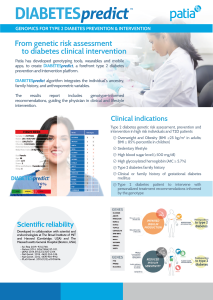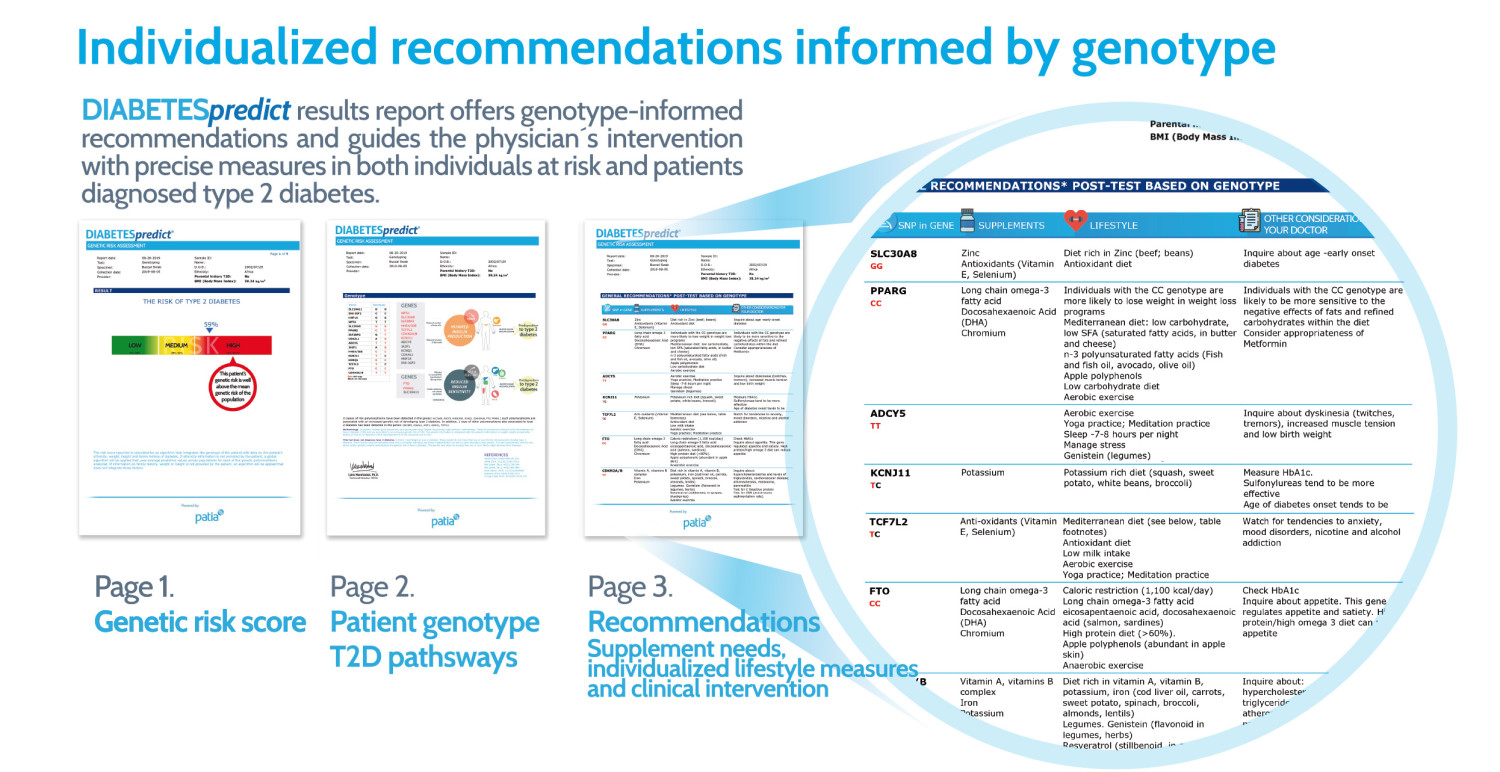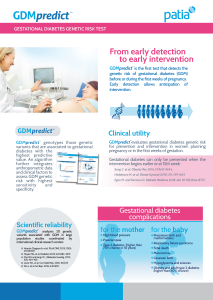Pioneering genetics for prevention and treatment of Type 2 Diabetes and GDM at the EASD2019
“A new era in the treatment of people diagnosed with diabetes is opened by providing precise recommendations to act on lifestyle with the information of our genes. The patient is our target. Public health, our goal,” MD. PhD. Mirella Zulueta, Medical Director of Patia.”
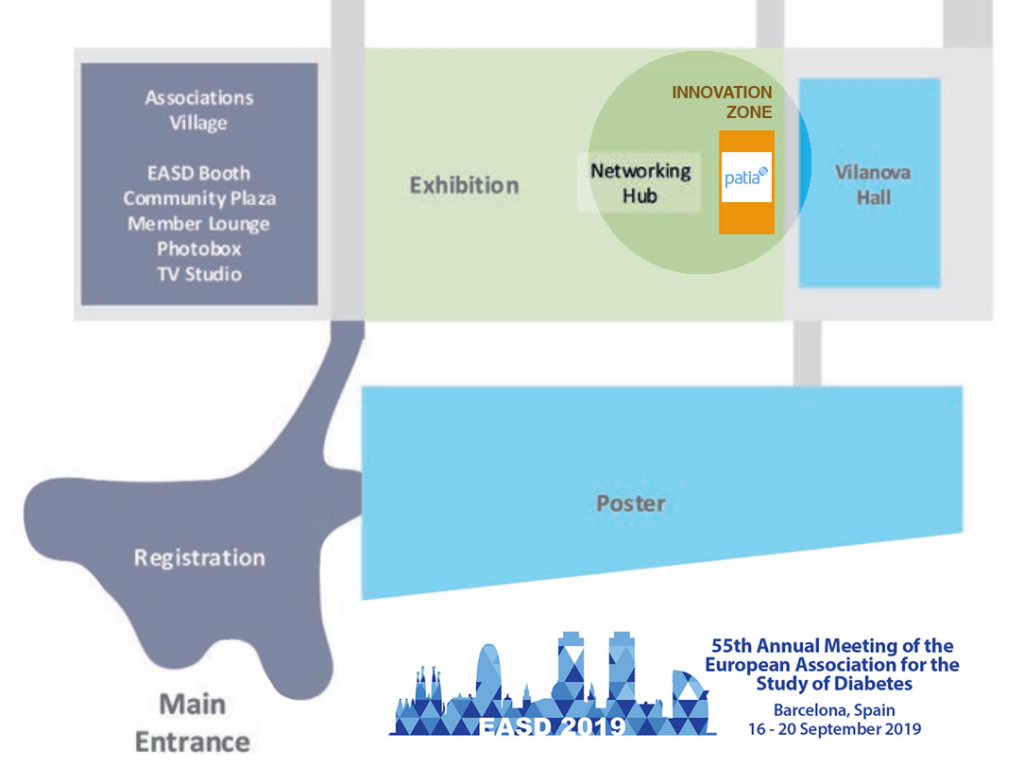
On September 17th PATIA displays the newest contributions in prevention and treatment of diabetes in the INNOVATION-ZONE OF THE EASD 55TH Annual Meeting
The EASD brings together the most prestigious and recognized scientists in diabetes to reinforce and support the most advanced research on diabetes, a pathology that has become a pandemic of the 21st century with serious consequences both for individuals who may suffer from it and for public health systems that face increasing costs in mitigating its effects.
PATIA presents the latest developments in high performance genotyping tests in type 2 diabetes with DIABETESpredict, gestational diabetes with GDMpredict and diabetic nephropathy with PromakerD, tests that include genotype-based recommendations for intervention with precise measures in treatment.
The 55th Annual Meeting of the EASD is held from 16 to 20 September 2019 at Fira Barcelona.
PATIA’s genetic test results reports have incorporated recommendations providing a series of specific guidelines on indicated supplements, specific lifestyle advice, and different laboratory tests or clinical suggestions that should be evaluated by physicians considering the personal history of the patient.
Save the date! Schedule a meeting with us when suits you best from Monday the 16th to Thursday the 19th emailing contact@patiadiabetes.com
DIABETESpredict
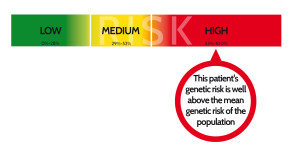
From genetic risk assessment to diabetes clinical intervention. The algorithm integrates the individual´s ancestry, family history and anthropometric variables to deliver a Results Report that includes genotype-informed recommendations to guide physicians in the intervention with specific treatment.
Focused both on improving therapies in the treatment of diagnosed type 2 diabetes and on the prevention of this pathology, it is the first genetic evaluation test of type 2 diabetes and allows both the application of early prevention measures and individualized recommendations for people with type 2 diabetes treatment.
These recommendations should be assessed in conjunction with a physician’s evaluation based on personal and family history, physical examination results, and other clinical and laboratory tests. Prevention of type 2 diabetes and obesity should include a comprehensive approach that considers diet, exercise, sleep and rest, emotional health, and stress.
GDMpredict From early detection to early intervention
From early detection to early intervention, it is the first test that detects the genetic risk of Gestational Diabetes Mellitus (GDM) before or during the first weeks of pregnancy.
GDMpredictTM is the first non-invasive genetic analysis that assesses the risk of developing GDM. This test simultaneously analyzes 20 genetic variants involved in the risk of developing the disease, obesity, folic acid and vitamin B12 deficiency. The risk curve for the development of GDM during pregnancy is established based on a mathematical algorithm that integrates the different statistical weight of each variant, family history, and anthropometric data of the patient
One in six births is estimated to be from women who had some form of hyperglycemia during pregnancy, and 84% of them are consequences of the Gestational Diabetes Mellitus (GDM).
When diagnosed, following a balanced diet and exercising are effective measures to keep the glucose levels under control. Therefore, the early detection is essential to reduce the risk of complications. The combination of the analysis of genetic variants with the patient’s clinical, gestational and family history has ensured significant perspectives in the early diagnosis of GDM.
PromarkerD early detection of diabetic kidney disease
PromarkerD is a simple blood test that uses a unique protein ‘fingerprint’ to 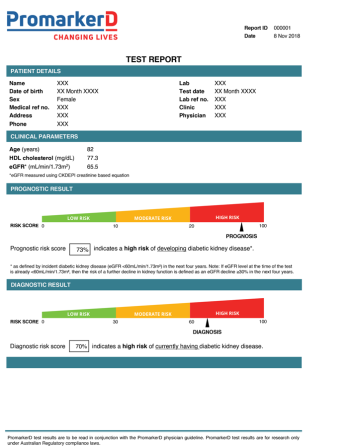
Proteomics International managing director Dr Richard Lipscombe said that, “as the first country in Europe to adopt the PromarkerD test, Spain would be at the forefront of diabetic kidney disease diagnosis and prevention.”
- Proteomics International has officially launched PromarkerD in Spain under a deal with Patia Europe
- The PromarkerD test system for diabetic kidney disease is the first test globally capable of predicting the onset of diabetic kidney disease
- In published clinical studies, PromarkerD correctly predicted 86% of previously disease-free patients who went on to develop chronic kidney disease within four years
The scientific program offers researchers and healthcare professionals the opportunity to share ideas and learn about cutting-edge research and technology, innovative studies and significant advances in diabetes research, treatment and care.
The EASD brings together the most prestigious and recognized diabetes scientists with the aim of strengthening and supporting the most advanced research on diabetes and promoting the new generations of leaders in research into this disease that has become a 21st century pandemic with serious consequences both for individuals who may suffer from it and for public health systems that face increasing costs in mitigating its effects.
Patia DIabetes
Latest posts by Patia DIabetes (see all)
- From gestational diabetes to type 2 - 10 November, 2020
- COVID-19 & Diabetes: the dangerous interaction of two pandemics - 24 June, 2020
- New Covid-19 features in DIABETESprevent app - 7 April, 2020




